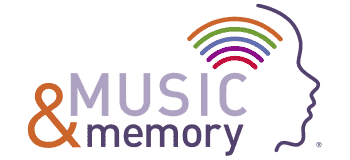 Someday in the not-too-distant future, If Christy Parsons has her way, everyone who comes to live at a Schlegel Village will receive an iPod and headphones.
Someday in the not-too-distant future, If Christy Parsons has her way, everyone who comes to live at a Schlegel Village will receive an iPod and headphones.
Recreation & Community Partners Consultant for the network of 12 long-term care and retirement communities in Ontario, Canada, Parsons oversees a system-wide initiative, begun this past January, to bring Music & Memory’s personalized music program to each Village. The facilities are distinguished by an indoor “Main Street” of cafes and shops, spaces designed as hubs for socializing, and a strong sense of community.
“We Have to Do This”
Schlegel Villages leadership made a $10,000 commitment to the iPod program after the COO, Parsons and other Schlegel Village team members viewed Alive Inside: The Story of Music & Memory and heard Executive Director Dan Cohen speak at a conference last August.
“We looked at each other after watching the documentary and said, ‘We have to do this,’” recalls Parsons. “It’s such a simple but profound approach.”
The money was used to purchase 124 iPods and headphones, distributed to 11 of the Schlegel Villages (the twelfth village will open later this summer) in January. Each community was then charged with obtaining certification through Music & Memory’s webinar training program by March. All met the challenge, and Parsons says that at least 60 long-term care residents, most dealing with memory loss due to Alzheimer’s, dementia or brain injury, are now benefitting from their own personalized playlists.
After Only Two Months, Clear Benefits
Though the program has only been in place for a few months, therapeutic benefits are already making a big impression on staff and family members.
“One resident used to do a lot of calling out during meals,” says Parsons. “She couldn’t sit through dinner. Now her aides set her up with an iPod a half-hour ahead of time. She’s able to sit and enjoy her meal.”
Another resident, unable to relax and get needed rest in the afternoon, now lies on his back in bed and plays air guitar while listening to his iPod. People are happier, smiling more, reports Parsons.
Tracking Reductions in Psychotropic Medications
The most significant change, however, is in reduced use of psychotropic medications. According to Parsons, one woman who had been on psychotropics to reduce symptoms of dementia—the first to receive an iPod last fall—has had her medications cut in half. “We hope to begin tracking reduction in psychotropics with the help of researchers in the near future,” she adds.
The program’s rapid implementation and early success is due in large part to a comprehensive team effort and high-level commitment at the corporate level. Directors across all units—general management, nursing, food service, housekeeping, recreational therapy—were brought into the planning process.
“Everyone Has a Part to Play”
“We’re trying to create cross-functional teams and avoid silos,” says Parsons. “Everyone has a part to play. It’s not just a recreation program that ends when a particular therapist happens to leave. We want everyone, from the nurses to the personal support workers to housekeeping staff, to be excited about the program and help Mr. Smith put on his headphones if he needs them.”
Of the 2,500 residents living in all of the Villages, Parsons estimates that at least 60 percent are dealing with some sort of memory impairment and could benefit from the Music & Memory program. All of the communities include long-term care units, and some also include a range of living options, from independent to assisted living and specialized memory care.
This year’s target is to have 160 residents equipped with iPods and personalized playlists by the end of December. Parsons says she’s confident they will exceed that goal.
To obtain more iPods, Schlegel Villages are working with area churches and schools to run donation drives. A recent feature article in the Kitchener, Ontario, newspaper has already garnered five donations.
Spreading the Music System-wide
The biggest challenge so far? Getting staff beyond the fear that the iPods will get lost or stolen. Some might go missing, Parsons admits, but she cites Dan Cohen’s experience that for the most part, if an iPod is lost, eventually it is found.
Staff worries about not having enough time to do all the training and music research is another hurdle, but this has not been a major obstacle in practice. As Schlegel Villages builds out their program system-wide, Parsons hopes to identify a Music & Memory champion in each Village who will spearhead the program, as well as recruit volunteers to assist residents with creating their personalized playlists.
She’s optimistic that her long-range goal of an iPod for every Schlegel Village resident will someday be realized. “People get really excited when they see the Henry video clip,” says Parsons. “Everyone can understand. Everyone relates to music.”
Photo Credit: cszar via Compfight cc
Want to bring personalized music to residents in your care facility? Please download Music & Memory’s free guide, Making the Case for Personalized Music: A Guide for Elder Care Professionals.
Founded in 2010, Music & Memory® is a non-profit organization that brings personalized music into the lives of the elderly or infirm through digital music technology, vastly improving quality of life.
